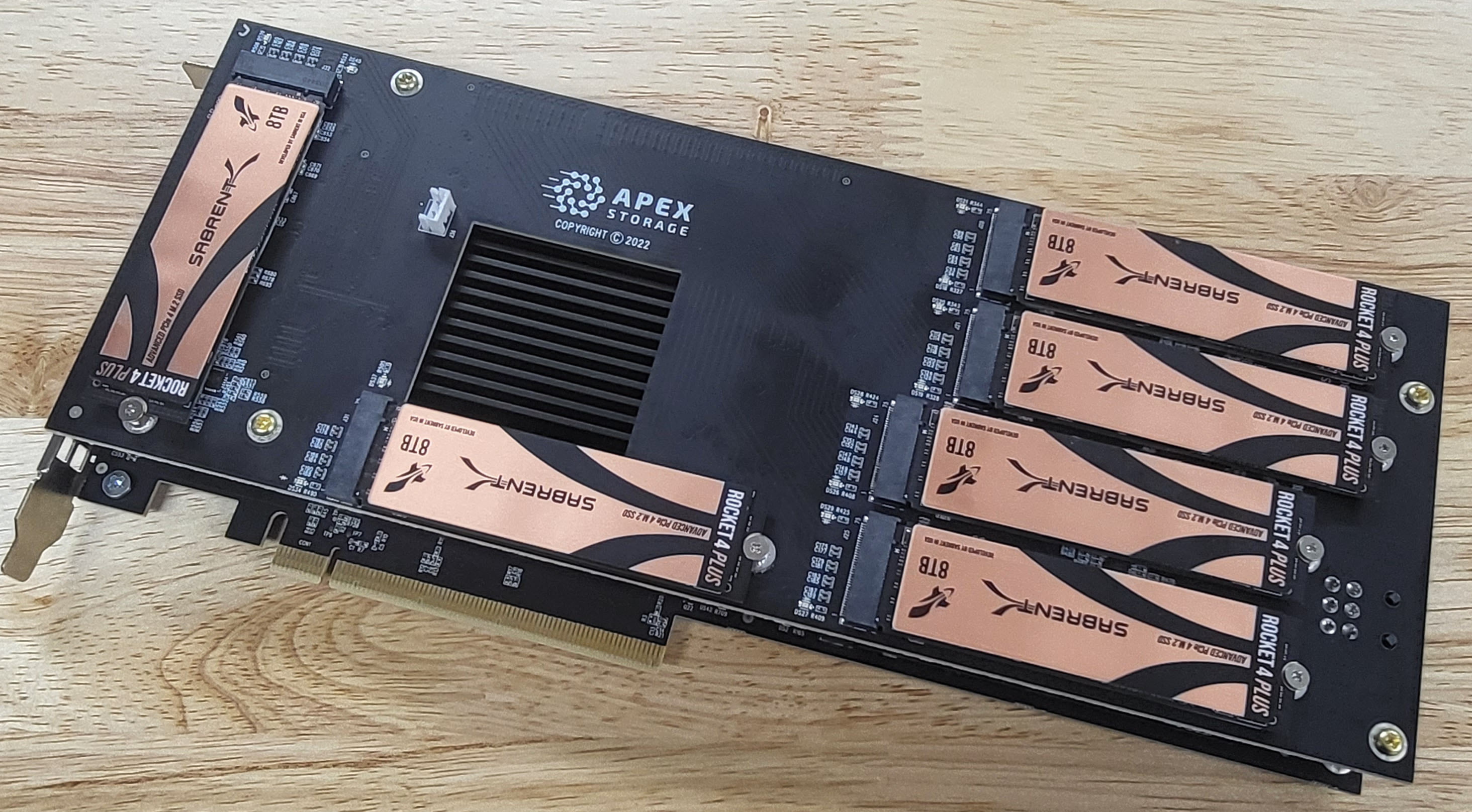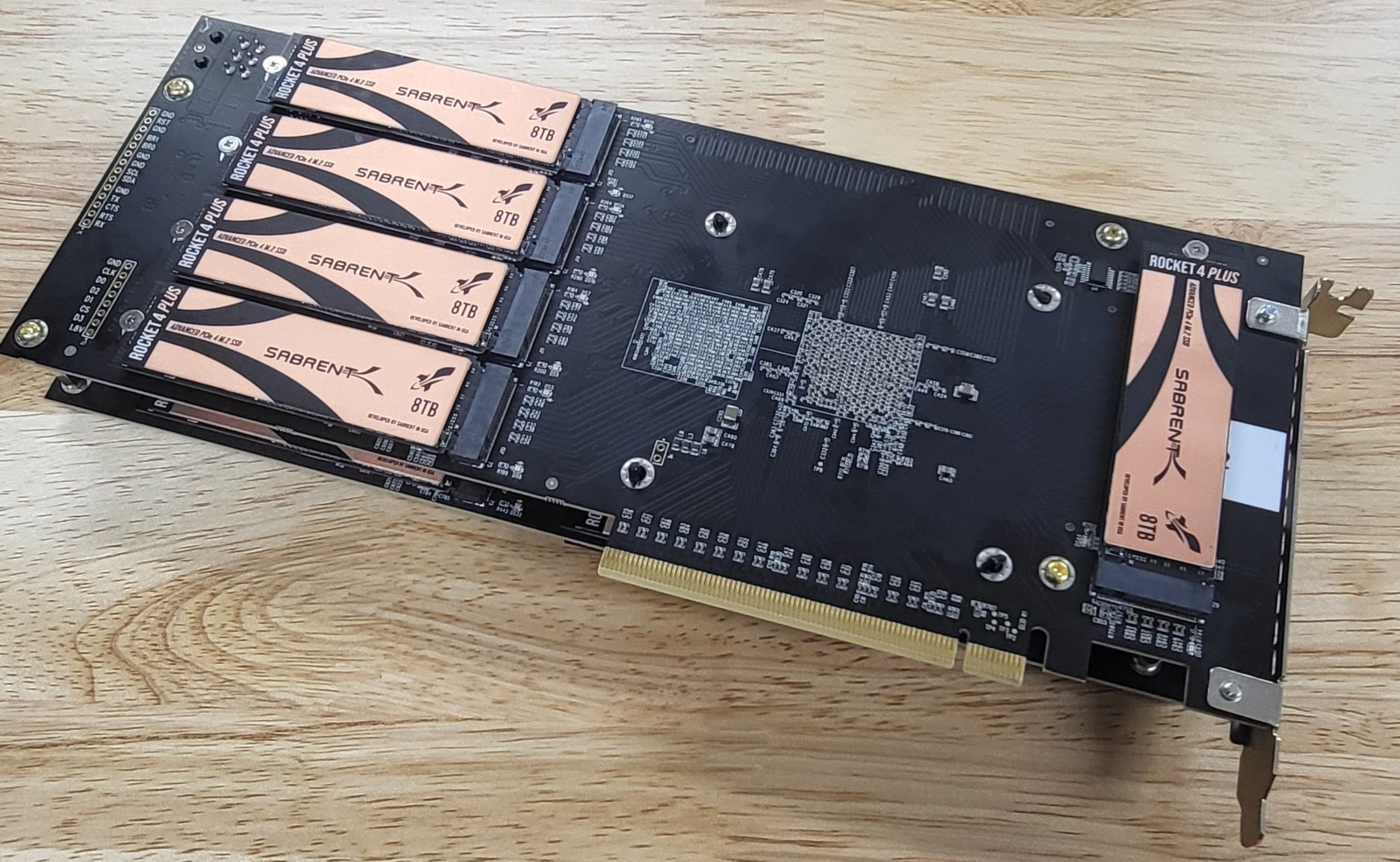Over $23,000 Worth of Sabrent SSDs Deliver 168TB at 31 GB/s
Get Tom's Hardware's best news and in-depth reviews, straight to your inbox.
You are now subscribed
Your newsletter sign-up was successful
Sabrent's Rocket 4 Plus SSD is one of the best SSDs around. Now imagine glomming 21 of these PCIe 4.0 SSDs together, because that's precisely what Sabrent has planned for the company's next product. The upcoming Sabrent Apex X21 Destroyer will arrive with 21 Rocket 4 Plus 8TB drives to offer unprecedented storage capacity and transfer speeds.
Sabrent is still conducting in-house testing on the Apex X21 Destroyer. However, the company said it easily achieved sequential read and write speeds of 31 GB/s. Sabrent's results even surpassed Apex Storage's figures, which rate the X21 with a sequential performance of 30.5 GBps reads and 28.5 GBps writes.
If you look at the brand's past products, such as the Sabrent RocketQ Battleship, Sabrent Rocket 4 Plus Destroyer, or Sabrent Rocket 4 Plus Destroyer 2, it's easy to see that Sabrent has a sweet tooth for big storage solutions. However, the Sabrent Apex X21 Destroyer is on an entirely different level. Previous solutions saw Sabrent assembling a crew of eight SSDs. Now, the Sabrent Apex X21 Destroyer has enough landscape for 21 drives, offering almost three times the storage and significantly more performance.


Sabrent's Apex X21 Destroyer is based on the X21 from Apex Storage. While Sabrent's prior AICs leverage the HighPoint SSD7540 PCIe 4.0 x16 RAID card, the Apex Storage X21 doesn't feature a RAID controller. Instead, it utilizes a pair of unnamed PCIe 4.0 switches. This allows consumers more freedom to set up the AIC to suit their needs. Nonetheless, the Apex Storage X21 is bootable and supports RAID arrays through software or third-party hardware solutions, like the ones from GRAID.
The X21 features a passive cooling design because the riser card's primary target is the server market. However, when deployed inside a regular system or even a workstation, the X21 will require some form of active cooling assistance. This is because so many PCIe 4.0 SSDs packaged together will output a fair amount of heat. Apex Storage recommends at least 400 LFM of airflow for the X21. In addition, given the considerable number of drives on the X21, the AIC needs two 8-pin PCIe power connectors to feed the entire lot of SSDs. It's basically like a high-end graphics card when fully loaded, at least from the power requirements perspective.
It's worth pointing out that maximum performance ends up being limited by the x16 PCIe 4.0 connection to the card. A single Sabrent Rocket 4 Plus 8TB can hit peak transfer rates of just over 7,000 MB/s in our testing, so 21 of them in aggregate could theoretically deliver 147 GB/s. However, an x16 PCIe 4.0 slot tops out at 16 GT/s per lane, and with 128b/130b encoding you're limited to at most 31.5 GB/s of actual throughput.
Sabrent hasn't established a price tag for the Apex X21 Destroyer yet, and there's no estimated time frame for when the AIC will release. Considering that each Rocket 4 Plus 8TB SSD currently retails for $1,099 (down from an official MSRP of $1,999 at launch), it would be foolish to think that the Apex X21 Destroyer will sell for less than $23,000. Moreover, the X21 sells for $2,800, so we have to factor that into the pricing. Even if Apex Storage offers discounts on volume purchases, the X21 still costs an am and a leg.
Get Tom's Hardware's best news and in-depth reviews, straight to your inbox.

Zhiye Liu is a news editor, memory reviewer, and SSD tester at Tom’s Hardware. Although he loves everything that’s hardware, he has a soft spot for CPUs, GPUs, and RAM.
-
drtweak Now only if there was some kind of imposer or device that could then say use the bandwidth of PCIe 5.0, but have 4.0 devices like this connected to it. So even though each device would still be 4.0, could utilize the speed of 5.0. Yea you could just use 5.0 drives, but what would be the fun in creating that device then.Reply -
kjfatl Reply
What happens if you have a bad sector on a single SSD? The software maps around it. If the drivers for this module are any good they will incorporate bad-sector, bad-drive and even bad pcie-lane logic. Some users might even set this us as RAID using 2 or more boards in a single system.Amdlova said:Really impressive... imagine now one bad stick....
It will be a nightmare -
abufrejoval Reply
Well and why use PCIe 4.0 devices when you are bandwidth constrained on the host link: I really like the idea of recycling four of my PCIe 3.0 1TB NVMe devices into one 4TB drive delivering PCIe 5.0 bandwidth in pretty much a 2.5" form factor that connects to an M.2 socket on the board via a ribbon cable.drtweak said:Now only if there was some kind of imposer or device that could then say use the bandwidth of PCIe 5.0, but have 4.0 devices like this connected to it. So even though each device would still be 4.0, could utilize the speed of 5.0. Yea you could just use 5.0 drives, but what would be the fun in creating that device then.
To my understanding PCIe switches do store-and-forward processing of packets, not just lane switching, so aggregating bandwidths should be possible. But since I've never seen that anywhere, I'm not very sure I got the theory right.
Yet the single most important obstacle to all of this seems the economy, because PCIe switch chips are crazy expensive, even more so if they support PCIe 5.0.
And those prices again are something I just don't understand because the IOD in a Ryzen SoC is essentially such a PCIe switch (and does even more stuff like Infinity Fabric, DRAM, USB, SATA) yet can be had with a hexacore Ryzen 5 5600 CPU included for around €100. -
camtasia_kid Clear to me that $23,000 is a small price to pay, for having my ProxMox and TrueNas lab load a bit quicker. Mercifully, through blind luck, my DogeCoin and BTC gains have been substantial, so I can help Sabrent test this, without my wife or children even noticing the purchase. The wife does get angry when I bring in hardware that makes noise, such as recent servers from HPE. Besides, even if she does notice, I make the money in this family, she can go pound sand.Reply